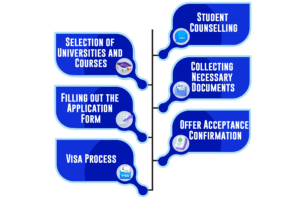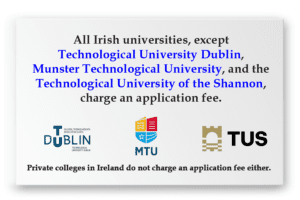September Intake in Ireland Application Process [+Expert Guidance]

Welcome, future scholars! Are you thinking of Ireland as your study haven? Well, you’re onto something extraordinary, especially with the September intake doors wide open – it’s prime time to apply!
In this blog, we’re your roadmap to success, laying out the exact steps to land admission to your dream university. Trust our experts, and let’s make your academic dreams in Ireland a reality. Ready to dive in? Let’s roll!
| |
6 Steps for September Intake in Ireland Admission Process 2025
1. Student Counseling
When you are figuring out your study path and have no clue where to start, you can hit up an Ireland study expert. Don’t worry if you’re lost and have no clue about what to study or where to start; your first counseling call with an Ireland expert will answer all your questions.
Most of the time, the first call is free and is used to give you all the most essential information. Later, it is up to your study abroad consultant to decide whether to provide in-depth, personalized counseling for free or to opt for their premium package.
We offer free PREMIUM counseling at Sarem, where we give you information that is specific to your profile.
Our experts carefully review your academic record. So, we don’t just throw a bunch of options at you; instead, we help you take the time to understand your interests and what makes you tick. It’s like having a chat with a friend who knows the academic ropes. They guide you through the maze of courses, suggesting courses that align with both your academic and personal interests.
If, on the other hand, you know exactly what course you want to take, we will help you find the best requirements, university, and scholarship options. So, no more feeling like you’re wandering in the dark—our counselors have your back!
| Looking for admission help? |
2. Selection of the University and Courses
Once you’ve got all the suggestions from your study abroad expert, it’s time to make a decision!
The suggestions you have in hand are already filtered based on your preferences and academic strengths. Now, dive into the university’s website, hit those course pages, and get the lowdown on what they’re serving up with those modules.
If the university offers any specialized modules or opportunities for a course, your counselor spills the beans ahead of time. So, you’ve got the game plan before you even start your research.
Here at Sarem, we’re all about empowering our students. We’re like, “Hey, use the info we give you as your study toolkit.” It’s like having the codes to know what the college brings to the table that clicks with your interests.
Dig into the details of the courses. Check if they vibe with your future goals and dreams. Now, for the university part, think of location, campus life, and maybe even the campus food scene. Hit up some online reviews; it’s like getting the inside scoop.

3. Collection of Necessary Documents
After choosing universities and programmes, submit the following documents for your September Ireland intake:
- Resume
- Passport Copy (front page and last page)
- Academic transcript
- Degree certificate or provisional degree certificate
- English language test scores
- 2 Recommendation Letters (from your College/employer on the letterhead paper of the Institution / Organization)
- Statement of purpose (SOP)
- Work Experience Letter (s) (if any)
- Certificates of Extracurricular Activities (if any)
- Birth Certificate Copy (may be required by only some Universities in Ireland)
4. Filling the Application Form
The next step will be filling out the application forms for all the universities that you wish to apply to.
Most universities in Ireland have an online application system where students can submit their application and pay the application fee. You fill in your information, pay an application fee, and boom, it’s done.
Sometimes, the university might need extra details, but if you’re rolling with a study consultancy, they’ve got your back. Your consultancy and universities are linked, and they send your application through their portal, so your work is handled by them. The university then reviews your application, and if everything checks out, you will receive that golden admission offer.

5. Acceptance Confirmation:
When an Irish university sends an offer letter to an applicant, the offer acceptance confirmation process typically involves the following steps:
- Reviewing the offer letter: Upon receiving the offer letter, check it out carefully—see if there are any conditions, like grades or English skills.
- Accepting the offer: Log into the university’s online portal and follow the instructions to accept the offer within the specified deadline. Sometimes, you might need to fill out a form or throw in a deposit to secure your spot, but if you’re going through a counselor, they handle that part.
- Meeting Conditions (if applicable): If the offer is conditional, ensure that you meet the specified conditions, such as providing final transcripts or English language qualifications, and submit the required documents to the university. Make sure you check those boxes. It’s like making sure all the pieces fit before diving into your exciting university journey.
- Finalizing accommodation and other arrangements: Once all’s good, dive into sorting your accommodations and preparing for the program kick-off.

6. Visa Process:
Once you’re all in for the university adventure, you might need to snag a student visa.
The university sends you a confirmation letter of admission, even if it was a conditional offer previously; it should now be a final confirmation letter after you have completed all of the university requirements. You can now begin the online visa application process, gather your documents, and then wait 4 to 8 weeks.
If you have been granted your visa, you’re good to plan your journey. And hey, if it’s a ‘no,’ don’t stress. You can shoot your shot with an appeal, explaining why. Plus, Ireland has a solid 95% success rate for student visas.
Again, if you go through a consultancy, they will guide you through the entire visa application process.
| Students also read: A Complete Guide to Ireland Visa Application Process [Step-by-step instructions] |
September Intake Ireland Admission Process [Expert’s advice]
1. Don’t hesitate or be shy about talking to your counselor if you don’t have any idea what course to choose. We’re here to help, considering your grades, what you love, where you see your career going, and what the future holds for your job.
2. No need to twiddle your thumbs until graduation – you can kick off your master’s program application in your last semester. They might shoot you a conditional offer letter. Just show you nailed your undergraduate scores, and you’ll snag the official offer letter before diving into the visa application.
3. The same holds for your IELTS or other English-language test results. These scores are not requested in a conditional offer letter from an Irish university or college. But when you’re eyeing that final offer letter, make sure you’ve got those scores handy for the visa application. It’s like a checklist for your study journey.
4. Suppose you’re aiming for courses at Atlantic Technological University, Technological University of the Shannon, Dundalk Institute of Technology, or any private Irish college. In that case, you don’t have to stress about the university SOP procedure. It’s like a little exemption perk here.
5. The top Irish universities [such as TCD and UCD] do not accept applications with more than a five history of arrears. Other universities are more lenient about it. So, pick your university match wisely!
6. In Ireland, whether you want to get your bachelor’s or master’s degree, they will let you have an idle six-month study break. After that, show them you’re up to something by proving you’re enrolled in a course or gaining some work experience.
7. For diving into a master’s program in Ireland, they usually look for a four-year undergrad degree. But hey, if you’ve got a three-year college degree, don’t stress! Universities might still consider you if you’ve got some work experience. Just a heads up, though – Maynooth and the Technological University of Dublin are a bit stickier for that four-year degree.
8. If you’re a diploma grad eyeing a master’s gig in Ireland, show off your strong work skills! Ireland is all about experience, so if you’ve got five or more years under your belt. In this case, you will have to fill out the Recognition of Prior Learning (RPL) form when you’re applying.
9. If you want to apply for a master’s programme that is not related to your field of study, you can still get in by demonstrating relevant work experience in the field you want to apply for. This is another instance where you must fill out the RPL form.
So, there you have it – your guide to conquering the September intake application process in Ireland. By following these steps and trusting our expert advice, students can breeze through the application journey. If you ever hit a roadblock or need a friendly hand, click the button below to fill out our counseling form. We’ve got your back on this exciting academic adventure! 🌍🎓✨
SOME USEFUL ARTICLES FOR YOUR REFERENCE






Request a Call Back
Comments are closed.
